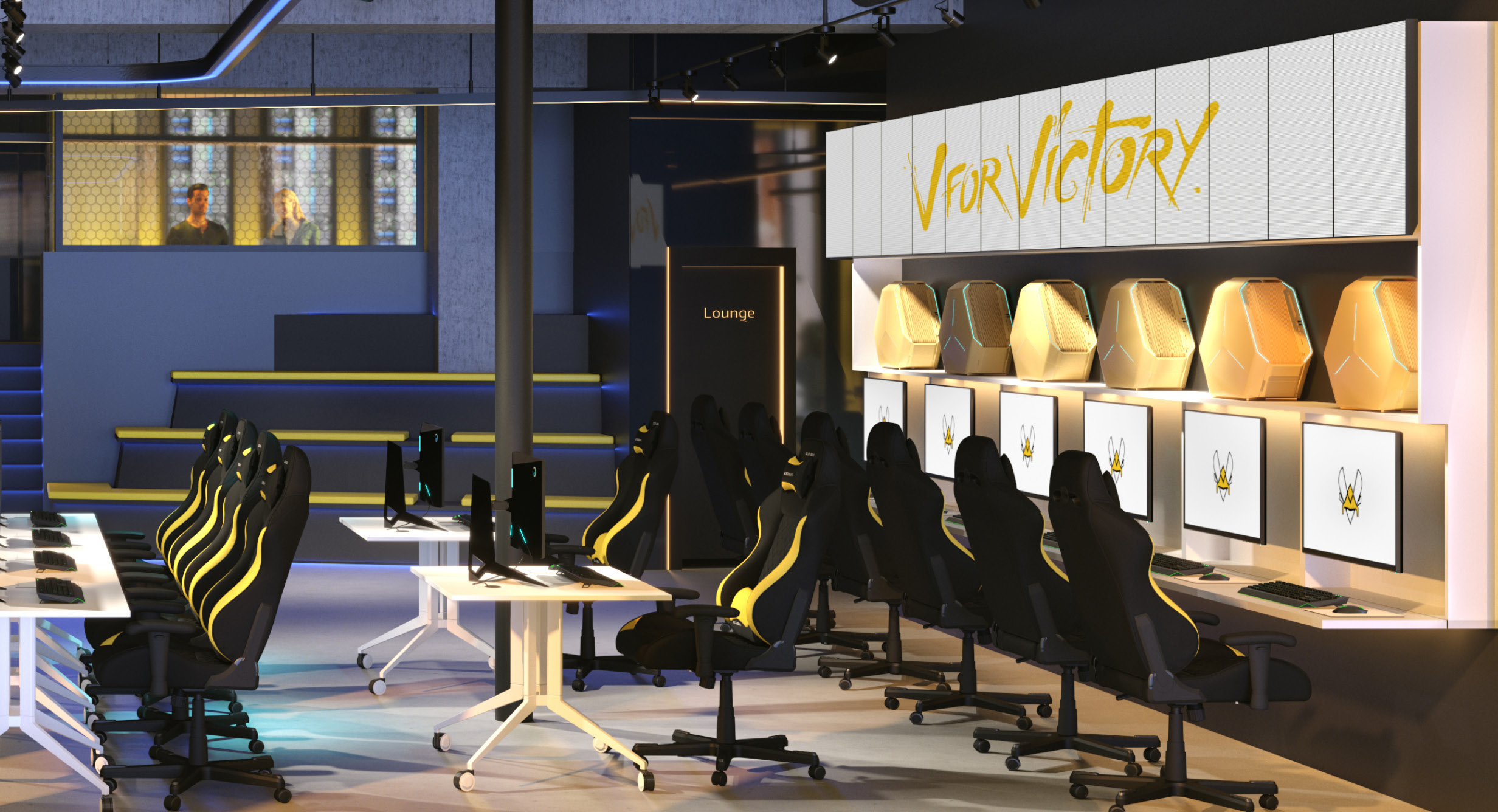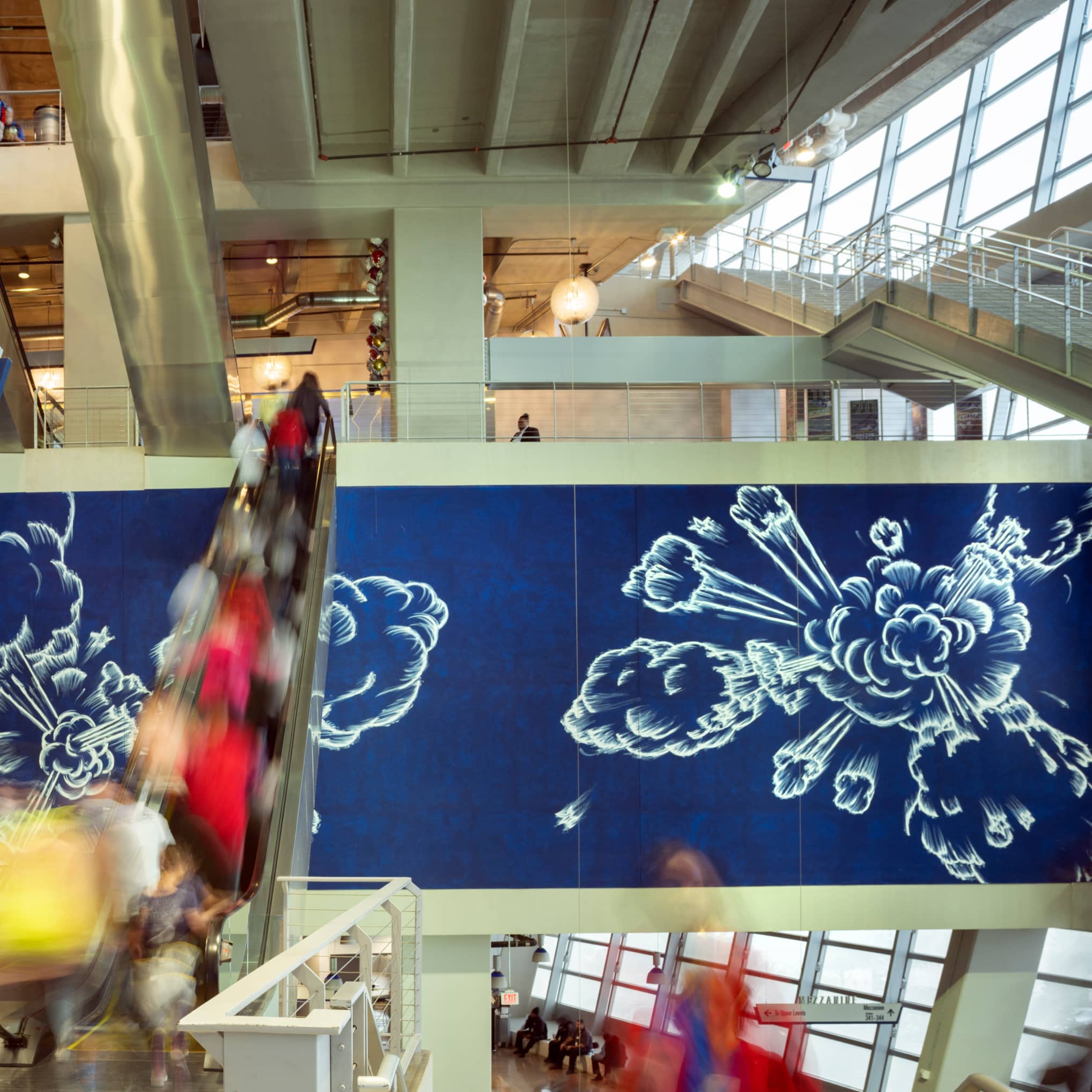
HKS Designs Team Vitality Headquarters in Paris to Draw Esports Fans — and Everyone Else
As esports thrives with the backing of big-name investors, more teams of professional video gamers are transitioning from digital realms to their own brick-and-mortar offices.
But when HKS partnered with French esports organization Team Vitality to design its Paris headquarters, they envisioned something more inventive that would make the brand appealing to a wider audience. The design combines technology, retail, fashion, food and beverage to create a space with the look and feel of a trendy neighborhood hangout rather than a facility devoted solely to competitive gaming.
Housed in a traditional Haussmannian building near Place de la République, the sleek four-story Team Vitality headquarters includes private office space and high-tech rooms for content production and projection. The ground floor, however, is a public storefront with a central and versatile event space flanked by entrances through the Vitality shop and a stylish café. Team Vitality’s venue, known as V.Hive, can accommodate everything from immersive educational experiences, to live music, to product launches by the team’s sponsors and partners.
Anyone walking by can pop in for a latte, browse through Vitality merchandise or simply wander around and learn about the world of esports.
“Not everybody understands esports yet, but if you can translate esports through some other lenses, then it starts making it click for some people,” said Dustin Sweeney, a senior designer for HKS EXPlore, the firm’s branded experiences studio.

The event space can be repurposed throughout the day to create an array of revenue streams for the team. For example, in the afternoon, it can throw a League of Legends watch party, and in the evening, a sponsor can take over for a product launch. The space can also host jersey signings, DJ sets and birthday parties. Anyone from amateur gamers to influencers can rent the “boot camp” room to train and create content.
Team Vitality’s store has a boutique aesthetic, resembling a SoHo storefront rather than the typical merch stand at concert and sports venues. The café, designed with wood and warm finishes, is a cozy spot for the gamers’ families and partners as well as passersby who might not know anything about esports and just want to relax with a cup of coffee or a meal.
Tying the ground floor together is a series of LED video boards — a “digital ribbon” that flows from one space to the next, acting as a canvas for content from Team Vitality and its partners. It’s a venue that’s truly flexible for all user groups from staff to players to fans.
Embodying a brand
Esports’ monthly global audience already exceeds that of Major League Baseball and the National Hockey League, according to banking and investment firm Goldman Sachs.
The number of esports enthusiasts worldwide has skyrocketed from 58 million in 2012 to 173 million last year, research firm Statista reports. That figure is predicted to reach 297 million by 2022.
So when Team Vitality engaged HKS to design its headquarters, the design firm faced the challenge of translating a leading esports digital brand into an equally appealing physical presence.
Team Vitality, which competes in top esports tournaments, launched in 2013 and counts more than 50 players and hundreds of thousands of followers online. Its V-shaped logo is a bee that represents the team’s name and the value of teamwork. Hexagons are also a motif in the team’s content and merchandise, evoking the honeycomb cells of a hive.
The team’s cultural reach extends beyond competitive gaming, touching on fashion and music. Rapper and pro-gamer Kevin “Brawkso” Georges, a former Vitality player, serves as an ambassador and influencer for the team. Vitality also boasts major companies as sponsors, including sportswear giant adidas, multinational automaker Renault and French telecom Orange.
Those kinds of deals have fed the burgeoning esports industry, which is expected to hit $1 billion in revenue in 2019, according to market research firm Newzoo.
But even as esports rakes in cash and viewers, it’s still a young industry, and the design world lacks a blueprint for competitive gaming venues. The HKS design team brainstormed ideas with Team Vitality by exploring how other digital brands provide immersive environments. Designers and Team Vitality toured Coal Drops Yard, a former industrial complex in London renovated into a fashionable shopping district. The goal was to understand how brands are using technology to keep customers coming back.

Just like traditional sports teams, esports organizations have become lifestyle brands that promote gear, apparel and other products. HKS was intentional about designing for multiple audiences — from the loyal fan to the casual visitor — by creating a range of adaptable spaces within the team’s headquarters. Designers made the shop and café the main entry ways into the building because they encourage pedestrian footfall. Many existing esports headquarters are cutting-edge training facilities that are closed or largely restricted to the public, focusing on team training and not customer engagement.
HKS’ partnership with Team Vitality shows that esports real estate opportunities are not limited to big warehouse facilities. Competitive gaming can transform tired storefronts in city centers or shopping malls into vibrant spaces for all demographics.
“It’s not about trying to build some big shiny edifice,” Sweeney said. “It’s about trying to find the needs of the gaming community.”
Growing with the industry
Team Vitality’s headquarters have a simple, sophisticated design, with a palette that reflects the team colors of black and yellow. Large LED video boards face the street, providing the team with an illuminated façade where it can project content to passersby.
The digital ribbon that wraps around the ground floor can display the team’s creative content, whether that’s live streams, music videos or social media posts. Just like the screens in a sports stadium, the digital ribbon can also host the team’s sponsors and partners, creating additional revenue streams for Vitality.
The team can vary the audio and lighting in each room, creating an immersive experience reminiscent of a video game or a smart home. A state-of-the-art control room allows Vitality to orchestrate how digital content appears on the LED boards throughout the building, harnessing the power of “media servers” used in live entertainment and esports shows. This technology makes Team Vitality competitive with other event spaces in central Paris.

HKS will continue its foray into competitive gaming by partnering with Axis Replay, an Atlanta venue that offers space for daily gaming, coworking for tech companies and small- to medium-size esports events. The firm will design the company’s new space in an existing building and advise on a strategy that could help Axis Replay expand nationwide.
“What we’re trying to do is go bottom up, grow with the industry, learn how to satisfy the community, the team, the investors, the developers, everybody,” said Judson Rogers, esports manager and art director for the HKS sports and entertainment group. “If we grow with the industry and gain that knowledge, we can answer questions at all levels.”


